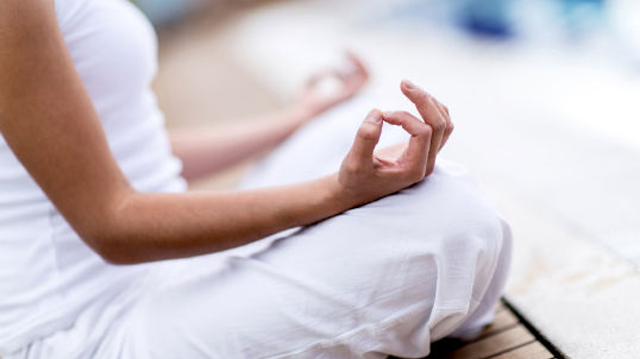
Unless you’re a little out of the loop, you’ve probably heard about the myriad benefits of meditation. These include fairly predictable benefits like increased concentration, decreased stress and anxiety, and a boost in overall feelings of happiness and wellbeing, to even more surprising benefits like decreases in chronic pain, a stronger immune system, and rebuilding of the brain’s gray matter.
Despite how well known and well researched these benefits are, many people still find it difficult to start and maintain a meditation practice. Reasons for this include misconceptions about how to meditate, feeling like they are ‘doing it wrong,’ or a perceived inability to fit meditation into an already busy schedule.
If any of these sound familiar, here are three important tips that will help you start and maintain a regular meditation practice:
1. Understand what meditation is—and isn’t
Many people wrongly believe that in order to meditate, you must have an empty mind, completely free of thoughts.
Here’s the truth: You don’t. Making the mind ‘empty’ for any sustained period of time is very difficult for experienced meditators and virtually impossible for beginners. Unfortunately, this belief makes many people feel like they can’t meditate, or are that they are ‘doing it wrong.’ If this sounds like you, it’s time to re-consider what meditation actually is.
Simply put, meditation is the practice of intentionally focusing your complete attention somewhere. Common focal points include the breath, an affirmation or mantra, or thoughts themselves. To meditate, you do not need to get rid of thoughts, you simply need to be aware of them. Many people say that they can’t meditate because they ‘think too much,’ or ‘can’t turn off the mind.’ If you’re having these feelings, it’s actually good: it means you are aware that you’re thinking.
When thoughts arise during meditation, instead of feeling like you’re not meditating or are doing it wrong, simply acknowledge them, and then bring your focus back to your breath or mantra. This is meditation!
2. Make it a routine
For those who think they don’t have time for meditation, consider this: we have time for the things we make time for. If you schedule your meditation session into your day, you will have time for it. Whether it’s the first thing you do when you wake up, the last thing you do before you go to bed, or part of your lunch break, make it a regular, routine activity in your day, and stick to it.
Meditation also does not need to be an incredibly time consuming activity. Ten minutes of meditation per day can give your body and mind a chance to relax, unwind, de-stress, and regain focus and energy.
Even as little as five minutes of focusing on the breath can be beneficial. In fact, a study that we covered suggested that five minutes of daily meditation could change stress perceptions, and thus decrease participants’ heart attack risks.
3. Pay special attention to frustration and anxiety
 Some of the most common thoughts and feelings that arise when you’re new to meditation run along the lines of: ‘this is too hard,’ ‘I’m doing it wrong,’ ‘I can’t do this,’ ‘what am I doing here?’ ‘this is pointless,’ and ‘why can’t I stop thinking?’
Some of the most common thoughts and feelings that arise when you’re new to meditation run along the lines of: ‘this is too hard,’ ‘I’m doing it wrong,’ ‘I can’t do this,’ ‘what am I doing here?’ ‘this is pointless,’ and ‘why can’t I stop thinking?’
All of these thoughts are totally and completely normal, and not evil or detrimental to your practice. They’re just thoughts, no more or less important than any others.
To meditate is to accept and acknowledge these thoughts and feelings as they are, without judgment. Whenever they arise, try responding with a brief, mental, ‘thank you for sharing,’ congratulate yourself for being aware of your thoughts, and then refocus your attention on the breath or whatever other focal point you are working with.
There’s no question about it: meditation is a wonderful technique, the benefits of which are only beginning to be explored and recognized. But it’s rarely easy, especially at the beginning! The most important steps you can take to reap the benefits are to make it a routine and not get discouraged. Your physical and mental health will thank you!
-The Alternative Daily
Sources:
http://www.thealternativedaily.com/5-minutes-of-meditation-reduces-your-risk-of-heart-attack
http://www.thealternativedaily.com/top-3-ways-meditation-can-benefit
http://zenhabits.net/meditation-for-beginners-20-practical-tips-for-quieting-the-mind

